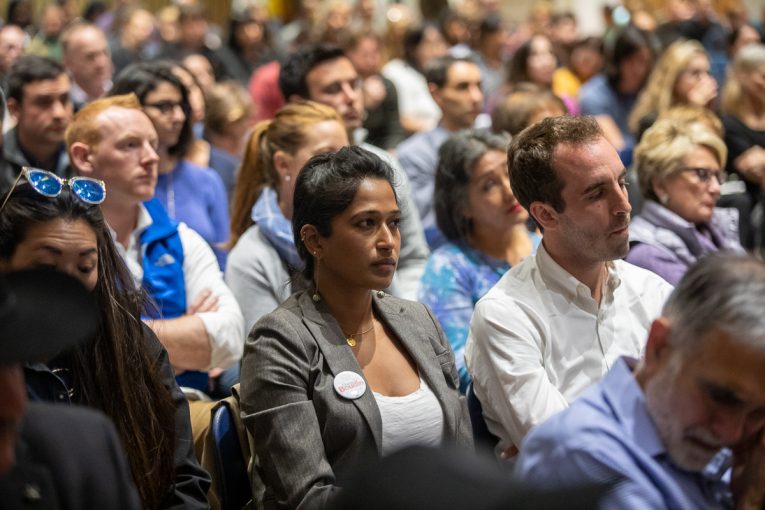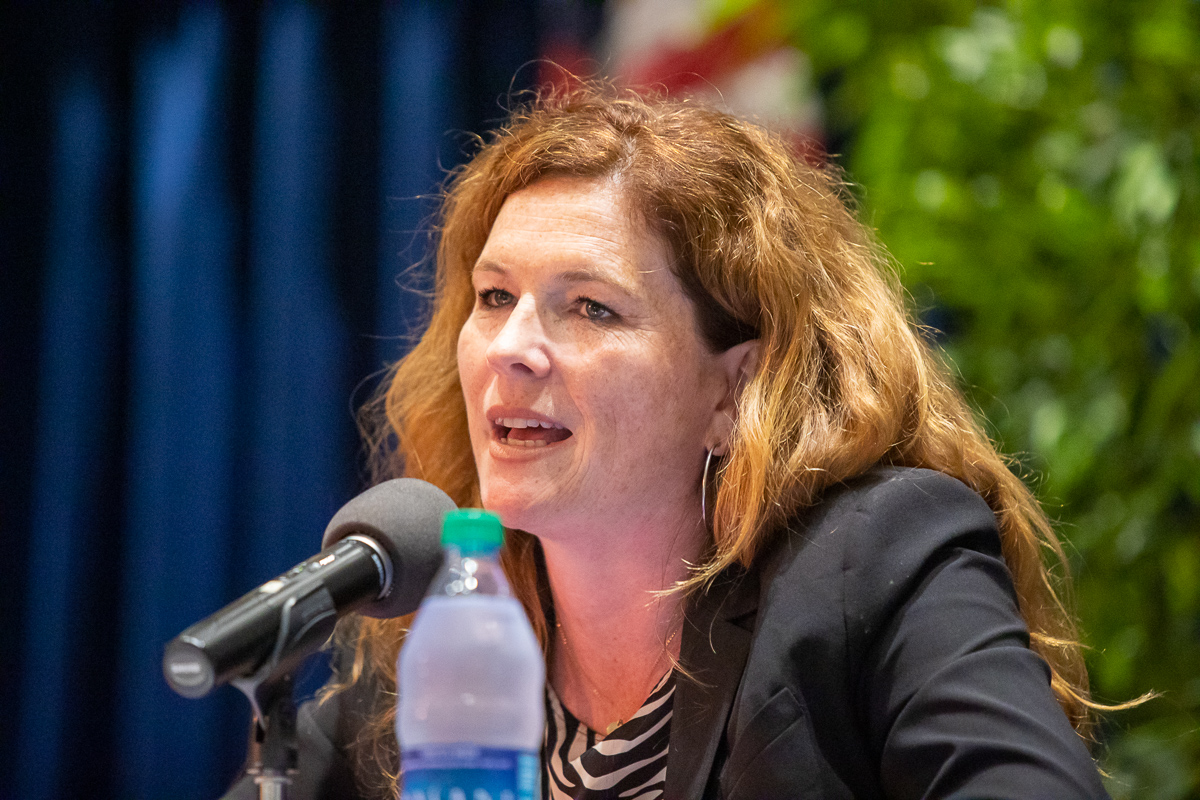
 San Francisco – District Attorney candidates vying for an open seat in November met at the UC Hastings Law School on Tuesday in a candidates forum sponsored by Eastern Neighborhood Democratic Club, ACLU of Northern California, Indivisible San Francisco, and Willie B. Kennedy Democratic Club.
San Francisco – District Attorney candidates vying for an open seat in November met at the UC Hastings Law School on Tuesday in a candidates forum sponsored by Eastern Neighborhood Democratic Club, ACLU of Northern California, Indivisible San Francisco, and Willie B. Kennedy Democratic Club.
All four candidates – Chesa Boudin, Leif Dautch, Suzy Loftus and Nancy Tung – participated. Organizers estimated 350 people were in attendance. The forum was moderated by Yoel Haile of the ACLU.
(See Part I – here)
The fourth question asked the candidates to respond to the closing of the juvenile detention facility.

Leif Dautch said he was proud to stand at Chesa Boudin’s side at the steps of City Hall when the proposal was first issued about shutting down juvenile hall. “It’s 80 percent empty, 32 kids there, ten of whom are misdemeanor charges (and) don’t pose a significant safety threat to anyone,” he said.
Mr. Dautch added, “I think the era of locking up kids is over.”
But, he said, the next question is what do we do about this state of the art, retrofitted building?
“We have a humanitarian public health crisis playing out in our city right now,” he said. He said opening a 150-person mental health center at the former juvenile hall “will rapidly improve those people’s lives.
“That’s going to be one of my top priorities if elected district attorney,” he said.
Mr. Dautch said, “Let’s treat kids like kids. I will not be seeking life without the possibility of parole sentences for people under 26.” He added, “The era of locking up kids in cages, locking up kids in adult prison is over. I want to be no part of that.”

Suzy Loftus said she has a plan “to end incarceration of children as we know it.”
She said, “This conversation is more than just about a building – it’s about kids and families.”
Ms. Loftus said, “Kamala Harris, who is supporting me in this race, said we’re not going to arrest and prosecute our way out of what’s happening in many of our communities. We need to fundamentally help kids sooner and earlier.”
She then quoted Toni Morrison, “She said, ‘if you’re in the position of power and trust, start with dreaming before you think.
“I think we have forgotten our dreams with regard to our kids,” she said. “With regard to our juvenile justice system, we are failing our kids every day.”

Chesa Boudin said, “I’ve supported closing juvenile hall since day one.” He said, “Closing juvenile hall. Treating kids like kids. Not putting kids in cages. (This) is a critical first step toward ending mass incarceration.
“Not only because it reduces the number of human beings that sleep in cages every night,” he said. “But also because of the school to prison pipeline.”
He described his brother who is a sixth-grade teacher, and many of the students in his classroom end up in prison.
“That’s what the school to prison pipeline looks like,” he said. “We need to transform the contacts that young people have with the juvenile justice system into opportunities for rehabilitation and intervention.”
He said, “Let’s go further, let’s close County Jail No.4, and let’s do it the first year I’m in office.”

Nancy Tung said she’s going to be very different than the other candidates, “I don’t feel we can close juvenile hall.”
She responded to some negative feedback from the audience and said “there are still going to be juveniles who are detained because a judge has determined they are too violent or too dangerous for public safety to be released into the community.”
Her concern is right now there are two juveniles that can’t be serviced in San Francisco. She opposes taking these juveniles out of their community.
“They’ve been shipped off to Los Angeles,” she said. “What’s going to happen with them? How are their families going to be able to support them?”
She said that they are going to be taken out of their community “when they need their community the most.”
The fifth question was about strengthening services for sexual assault victims and survivors of other violent crimes.
Suzy Loftus said that she was a domestic violence and elder abuse prosecutor, and “we haven’t done enough to bring survivors the healing that they need.”
She said most of the time, when interrupting the cycle of violence, “we often focus on the defendant, but we forget about the victim and the survivor, and when I say, forget, I mean fail them.”
She pushed for a domestic violence restraining order clinic as something “essential to your very sense of agency, your very sense of safety.”
She talked about the concept of parallel justice. We think about giving housing and treatment on the defendant’s side,  she said. “Do we think about giving housing, treatment and advocates to go to the clinic?”
she said. “Do we think about giving housing, treatment and advocates to go to the clinic?”
She said people need support and “someone who is walking you through the process.
“We’re failing victims and survivors,” she said. “We need to give a better response.”
Chesa Boudin said, “I understand that many of the people we accuse of crimes are people that are also victims and survivors of sexual assault.”
 He also noted that many people we send to prisons will be sexually assaulted while they’re there.
He also noted that many people we send to prisons will be sexually assaulted while they’re there.
“We need to take a much broader, more comprehensive view about what sexual assault looks like in our community, what we can do to prevent it rather than contributing to it, minimizing or ignoring it,” he said.
He said that the whole system is a problem – rape kits often gather dust despite the invasiveness of the procedure.
“That is a disgrace,” he said.
He noted that under his plan he will give survivors a voice in the prosecution “and we will prioritize them over the misdemeanors that account for two-thirds of the jury trials in the Hall of Justice.”
Nancy Tung said, “The cooperative restraining order clinic is something that is near and dear to my heart.”
“For two years, I was a domestic violence prosecutor – prosecuting felony crimes. Mostly against women and women of color,” she said. “I saw that these women, because they’re women, who work in this tireless non-profit – they actually did a lot of good. They gave victims a sense of safety and security with a restraining order that protected them from their abusers.”
She argued the need to expand upon these programs and find additional funding.
She called for a red flag law that allowed police to come in and take guns from people who threaten people and have mental illness. She called on San Francisco to fully implement it.
“It is outrageous in San Francisco, at the height of the me-too movement, that we are not doing right by the survivors of sexual assault and domestic violence,” Leif Dautch stated.
He pointed out that out of 757 reported sexual assaults last year in the city, the DA’s office only got nine convictions after trial.
“We wonder why reporting rates are so low,” he said.
That concluded the moderated question portion of the forum. The next part will be the candidate questions – where it got a bit testy at times.
—David M. Greenwald reporting

